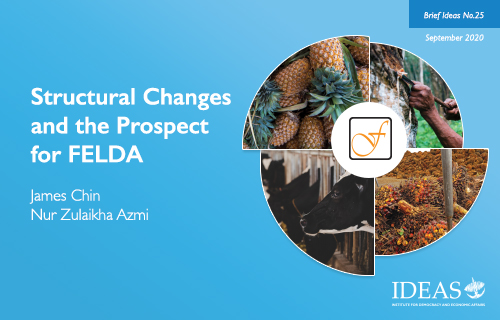IDEAS: FELDA task force must propose fundamental reforms to address structural issues

Kuala Lumpur, 2 September 2020 – IDEAS welcomes the government’s move to set up a task force on FELDA as follow-up to the white paper “Towards A Sustainable Federal Land Development Authority (FELDA)” tabled in Parliament last year. The FELDA task force is expected to table its findings early this month, which will include measures to ensure sustainability of FELDA and propose a new and better FELDA model. This is a step in the right direction. However, the forthcoming FELDA plan must tackle underlying issues faced by FELDA.
The government should clarify the direction for FELDA and the status of the White Paper. The proposal also must include a clear timeline and implementation plan. “The government should confirm its future policy direction for FELDA, including commitment to a clear timeline and implementation plan”, Zulaikha Azmi, researcher at IDEAS commented.
IDEAS published a GLC Monitor today titled “”. The monitor, co-authored by Professor James Chin of University of Tasmania and Zulaikha Azmi of IDEAS, highlighted domestic and international developments suggesting that the current FELDA model is no longer applicable going forward.
Firstly, the continued dependence on crude palm oil (CPO) exports is unlikely to be sustainable and product diversification is needed to improve resilience. Palm oil prices depend on the global price which has fallen because of the end of a commodity super cycle and global demand for palm oil is unpredictable at best. This affects FELDA’s earnings and the income of settlers which remain vulnerable to palm oil price swings.
The recent announcement of Felda Global Ventures (FGV) improved financial performance for the second quarter of 2020 largely due to higher CPO prices demonstrates its dependence on palm oil prices. “The fluctuation in CPO prices have so much impact on the profitability of FELDA. Malaysia has been hurt by these price fluctuations previously and we predict that these price fluctuations will continue for the long term”, says Professor James Chin.
Secondly, previous efforts to diversify FELDA income through commercialisation have not been successful in improving productivity and socioeconomic outcomes. The strategy of corporatisation including the listing of FGV has not succeeded in diversifying the revenue of the FELDA settlers – instead, the proliferation of FELDA subsidiaries has resulted in holdings in unrelated business areas.
Third, demographic shifts including heavy reliance on foreign workers and migration of younger generation of FELDA settlers to urban areas have raised the relevance of FELDA in meeting its socio-economic objectives. The model has not resulted in a sufficiently attractive prospect for younger generations to continue working on the plantations.
To move forward, we call for the government to focus on fundamental reform to FELDA. The anticipated FELDA task force proposal should go far enough to address the fundamental issues facing FELDA including those highlighted in the paper.
Commenting on this, Professor James Chin says “Rather than continuing to focus only on preserving FELDA, the government should prioritise the welfare of the settlers. This includes ensuring incentives for innovation and upgrading are better aligned. Adaptation may take time, so a sustainable strategy is urgently required.”
— END —
The paper can be downloaded .
For media enquiry, please contact Nur Zulaikha Azmi at zulaikha@ideas.org.my.

